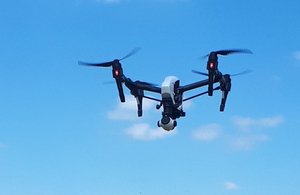New powers for the police to enforce drone laws
Air Traffic Management and Unmanned Aircraft Bill, giving greater police powers to prevent misuse, has second reading.

- police will have the power to land, inspect and seize an unmanned aircraft thanks to new legislation
- new stop and search powers around airports and prisons will help tackle illegal drone use, and those breaking the law could face on the spot fines
- drone users will still be able to obtain permission to fly drones for purposes such as photography and surveying
The government has acted to give police forces across the country new powers to tackle the misuse of unmanned aircraft, including drones, as the Air Traffic Management and Unmanned Aircraft Bill has its second reading in Parliament today (27 January 2020).
The legislation will give the police new powers to land, inspect and seize drones if an offence has been committed and a warrant is secured.
Drone users could also face an on the spot fine for certain offences such as failing to provide evidence that they have the correct permissions and exemptions if found to be flying their device too high or too close to buildings, or failing to provide evidence of competency or registration.
The bill will also grant the Transport Secretary new powers to ensure that airports modernise their airspace, delivering quicker, quieter and cleaner journeys. Modernising flight paths and the infrastructure of the sky will help reduce CO2 emissions from aviation, minimise noise for those near flight-paths and improve punctuality for passengers.
Transport Minister Baroness Vere said:
Drones have incredible potential, whether that’s by transforming how we move goods around or saving lives in search and rescue missions.
Most people using drones want to do so responsibly, and we encourage them to familiarise themselves with the law.
We are confident these police powers will be used proportionately to both deter careless drone use and to tackle serious, malicious criminal activity.
The bill will also give the police new stop and search powers around airports, prisons and other restricted areas. It will amend the Police Act 1997 to allow the police and senior prison authorities to authorise the use of counter-drone measures to combat illegal drone use.
This is just the latest action from government to ensure drones and other unmanned aircraft are used safely and responsibly. In October 2019, the government published its Counter-drone strategy and in November 2019 it became mandatory for operators of small unmanned aircraft to register themselves and take an online competency test, with 80,000 having registered so far.
Security Minister Brandon Lewis said:
This bill is a vital part of the government’s strategy to tackle the illegitimate use of drones and protect the UK’s growing drone industry.
For the UK to establish itself as a global leader in this exciting technology it is vital that police have the powers to crack down on those who intend to use drones to cause harm or disruption.
The government is also reviewing the UK’s approach to tackling the malicious use of drones, including testing and evaluating counter-drone technology.
Aviation, Europe and technology media enquiries
Media enquiries 0300 7777 878
Switchboard 0300 330 3000